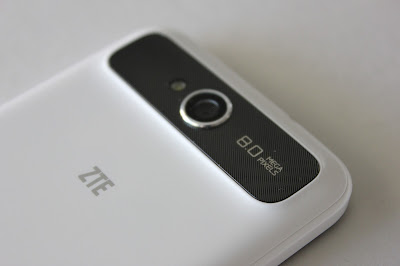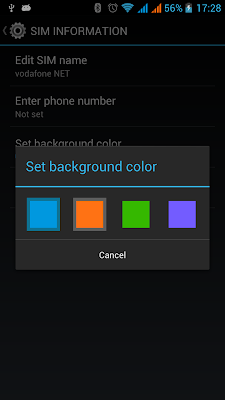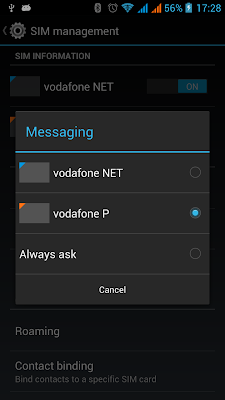IntroductionAlthough I was still very happy with
ZTE V970, specially now that it was already running Android 4.1 (Jelly Bean), I couldn't resist to try out a new smartphone based on the freshly released platform from MediaTek...
It was only a matter of time before ZTE came out with another device that would use the same look as its much anticipated Grand S. Announced as its fat brother, ZTE V987 (also known as Grand X Quad) is a Dual SIM Dual Standby smartphone based on MT6589 chipset
. Despite the fact that the newest MediaTek chipset was announced as supporting Dual Active functionality, it doesn't means that every phone would include such a feature. Probably due to development and implementation costs, this phone still does not include that feature. In fact, it is yet to be seen the first DSFA device based on MT6589 platform.
SpecificationsChipset |
| Name: | MediaTek MT6589 |
| CPU: | Quad-core 1.2 GHz ARM Cortex™-A7 |
| GPU: | PowerVR™ SGX 544MP |
| Instruction set: | ARMv7 (VFPv4, NEON) |
Software environment |
| Embedded:OS: | Android 4.1.2 (Jelly Bean) |
Body |
Dimensions
(width x height x depth): | 141 x 70 x 8.9 millimetres |
| Weigth: | 165 grams (battery included) |
| Color: | Black and white |
Battery |
| Capacity: | 2500 mAh |
Memory |
| RAM:capacity: | 1 GB |
| ROM-capacity: | 4 GB |
| Expansion slot: | microSD memory card, supporting up to 32 GB |
Network support |
| Primary phone: | GSM 850 / 900 / 1800 / 1900 MHz, UMTS 900 / 2100 MHz |
| Secondary phone: | GSM 850 / 900 / 1800 / 1900 MHz |
| Data links: | GPRS, EDGE, HSPA+ |
Display |
| Type: | IPS-LCD capacitive touchscreen / OGS (one glass solution) |
| Size: | 5 inches, HD resolution (720 x 1280 pixels) |
Camera |
| Main (rear): | 8 megapixels with autofocus and single LED flash |
| Secondary (front): | 1 megapixel |
Interfaces |
| Bluetooth (802.15): | Bluetooth 4.0 + Enhanced Data Rate + A2DP |
| Wireless LAN / Wi-Fi (802.11): | IEEE 802.11 b/g/n |
| USB: | USB 2.0 Client, Hi-Speed (480 Mbit/s)
USB Series Micro-B (Micro-USB) connector |
Satellite navigation |
| Built-in GPS module: | MT6628 chipset |
| GPS antenna: | Internal |
| Complementary GPS services: | A-GPS (Assisted GPS), MediaTek EPO (Extended Prediction Orbit), GLONASS |
Additional features |
| Sensors: | Gravity, Proximity and Light sensors |
| Analog Radio: | FM radio (87.5-108 MHz) with RDS radio receiver |
| Others: | Dedicated LED for notification of missed calls / new messages |
Very much resembling ZTE Grand S, this ZTE V987 features a 5 inch screen and measures 141 x 70 x 8.9 mm, being a little thicker where camera is located. The sides and back cover are made of white plastic, but in overall the build quality is very good. ZTE opted out to use OGS (One Glass Solution) technology to keep the smartphone relatively slim. After a week of use, I've found that most of the commonly used functions like swiping through menu, making calls, accessing music... all can indeed be done by using just one hand.
The three usual Android touch-keys are placed on the bezel – Back, Home and Menu. The buttons are illuminated by a backlight when the screen is turned on.
The volume rocker is placed on left edge, but not at the very top so that it can be easily reached while holding the phone with one hand. The microUSB port is located on that same edge, at the bottom.
The 3,5 mm headset jack and power button are located on the top edge.
One thing that was strangely missing on ZTE V970 was a front camera, but fortunately ZTE did not repeat the same mistake with V987. Placed right next to the ear speaker grill is the 1 megapixel front camera, which is very used nowadays for video chat purposes. On the opposite side is placed the usual power charging LED (red colored when charging and green when the battery is fully charged). The green LED also blinks to notify the user of eventual missed calls and / or new messages received.
On the back side, there's the 8 megapixels autofocus camera placed left to a single LED flash.
Placed in the lower-left corner, there is a small notch that allows you to (not too easily) peel off the rear cover, providing access to the SIM card slots, battery and microSD card slot.
The microSD card can be accessed without removing the battery, meaning that you can remove and replace memory card without turning the phone off, much like you would on a computer.
Display quality
The phone sports a 5-inch HD touchscreen display with 1280 x 720 resolution, offering a 320ppi pixel density. Text, icons, images and videos look sharp and the viewing angles are quite wide.
Under sun visibility on is very good, the screen used in this smartphone is reflective. The touch response of the screen is also good.
Functionality
The phone was released with Android 4.1.2 and hopefully will receive an update to Android 4.2.x in the near future. Aside from a few custom icons and a redesigned status bar, ZTE didn't change the interface too much, so we are present with a clean Jelly Bean UI.
Here are some screenshots and details of the most important features with a special detail of the dual SIM functionality.The notification panel provides a fast access for brightness and display timeout setting, enabling or disabling auto rotation, Wi-Fi, BT, GPS and data connection, as well as alternating between sound profiles.
So, nothing much to say about the stock Android 4.1 look...
The dialer interface is pretty standard, supporting smart dialing feature which works perfectly and very fast. There is only one call button, that can either pop up a dialog allowing the user to choose which card to dial from or can dial automatically from the SIM card that is set as default.
When the active application is Phone or Messaging the user can slide down the notification panel to easily switch between the default card for establishing phone calls / sending messages.
Within the call log history, calls can be filtered by received, established or missed calls, but can also be checked which SIM was used.
Under the dual SIM management menu several configurations can be set. The user can edit the name of each SIM and also set the associated background color that will appear in call log as well as in the notification bar (behind the network strength bars).
In the same menu, the user has the possibility to set a default SIM card to establish all outgoing calls or set it to always ask. The same thing can be set for messaging and data connection purposes.
Since the release of Android 4.0 we were presented with fancy controls for managing network data usage. The user can monitor total usage by network type and application and then set limits if needed. Of course, as mobile data can be enabled on SIM1 or SIM2, data usage of each SIM card can also be tracked.
It also natively supports tethering and portable hotspot feature, letting the user share mobile data connection through USB or over a wireless (Wi-Fi or even Bluetooth) network.
Just like it happened on the previous MediaTek platforms (MT6575 and MT6577), with the newest one (MT6589), SIM2 will be reachable even if there is an active data connection established on SIM1. The data connection will be immediately dropped when a new call is incoming from SIM2 and the download will be automatically resumed after the call is over.
The phone supports quad-band GSM as well as UMTS 900 MHz and 2100 MHz as confirmed under hidden MTK Engineer Mode.
The phone doesn't come pre-installed with Google apps, but that can be easily installed and all Google services work perfectly. As it can be noticed, I even got the chance to test the new version of Google Play Store.
Battery lifetime of this phone is impressive taking into consideration the display size. After a usage of almost two weeks, I estimate that battery can easily hold juice for three days. That is with Bluetooth turned on, 3G data connection always activated and alternating with Wi-Fi when hotspots available. Other than that, I haven't noticed any strange battery drainage.
Compared to the old MT6577 based devices, there is also a great improvement when it concerns to GPS performance. V987 locks very quickly and precision is much higher, at least when comparing it to V970.
The phone supports A-GPS and EPO (Extended Prediction Orbit), which is a MediaTek proprietary offline server based A-GPS technology. As for GLONASS, I wasn't able to connect to any satellites during the few times I used the GPS. During the next week I will test it further and update this review with additional info.
Final thoughts
I have to mention that this is the biggest smartphone I have ever had, but that's not really a big deal and nothing you can't get used to... and after all, it seems that the global trend is to have bigger and bigger phones. I'm really impressed with V987 performance, screen quality and battery lifetime. If you are looking for a good quad-core MT6589 phone, this is without any doubt a great choice.
- Amazing screen quality
- Great performance
- Size (may be considered too big, but there are no good alternatives)
- Price
























































